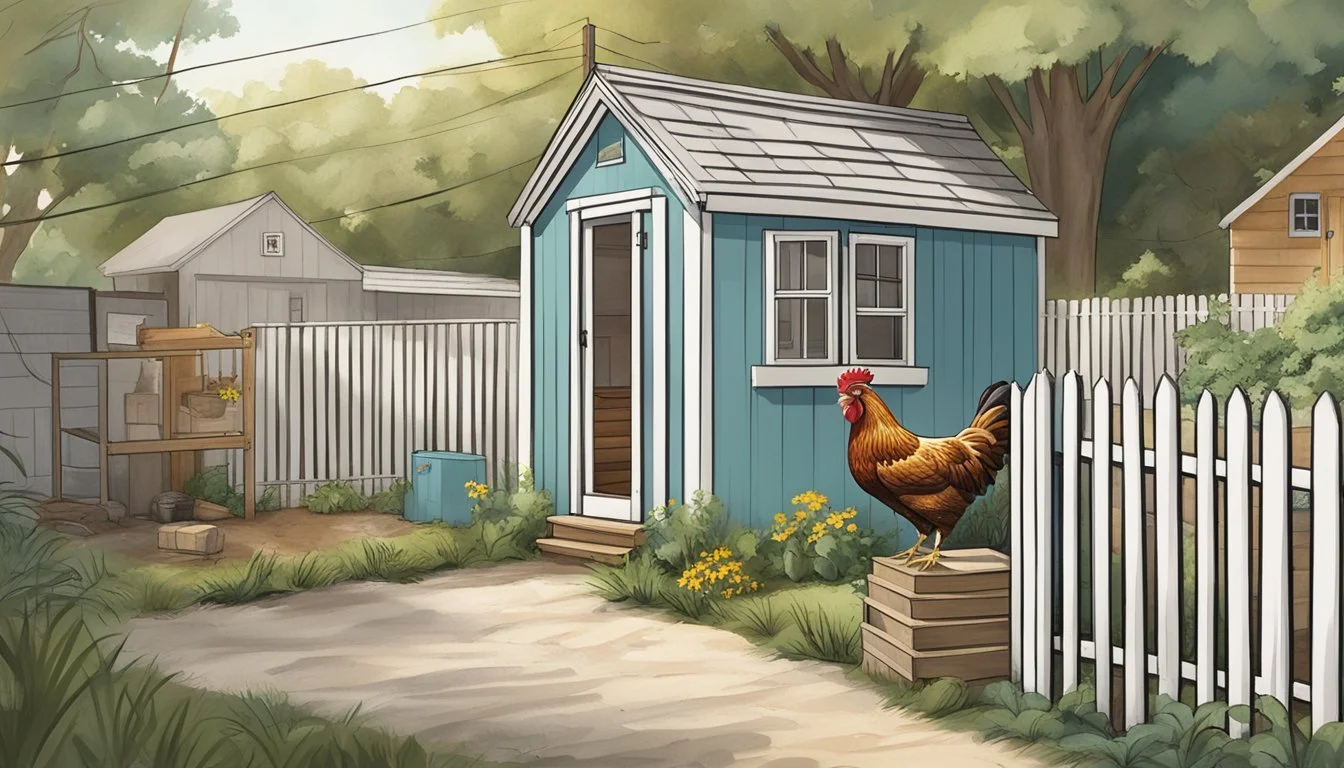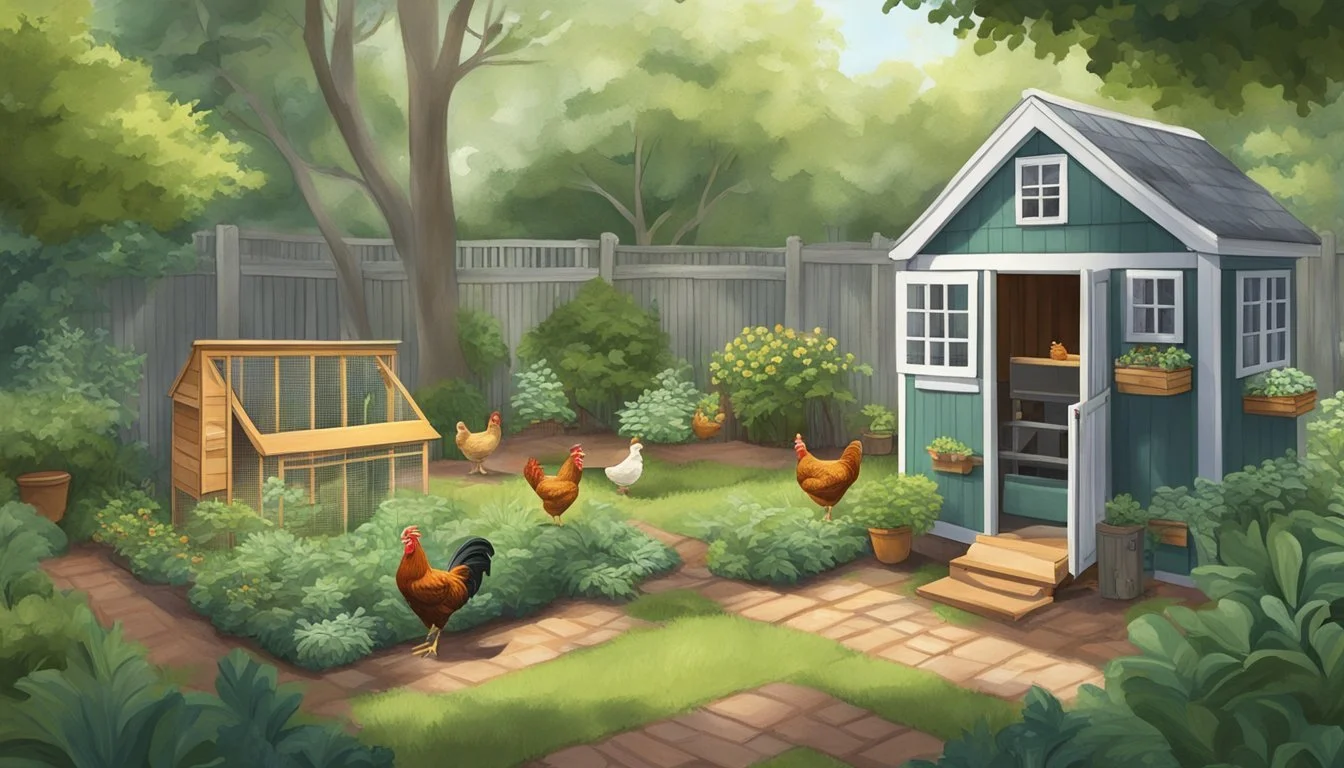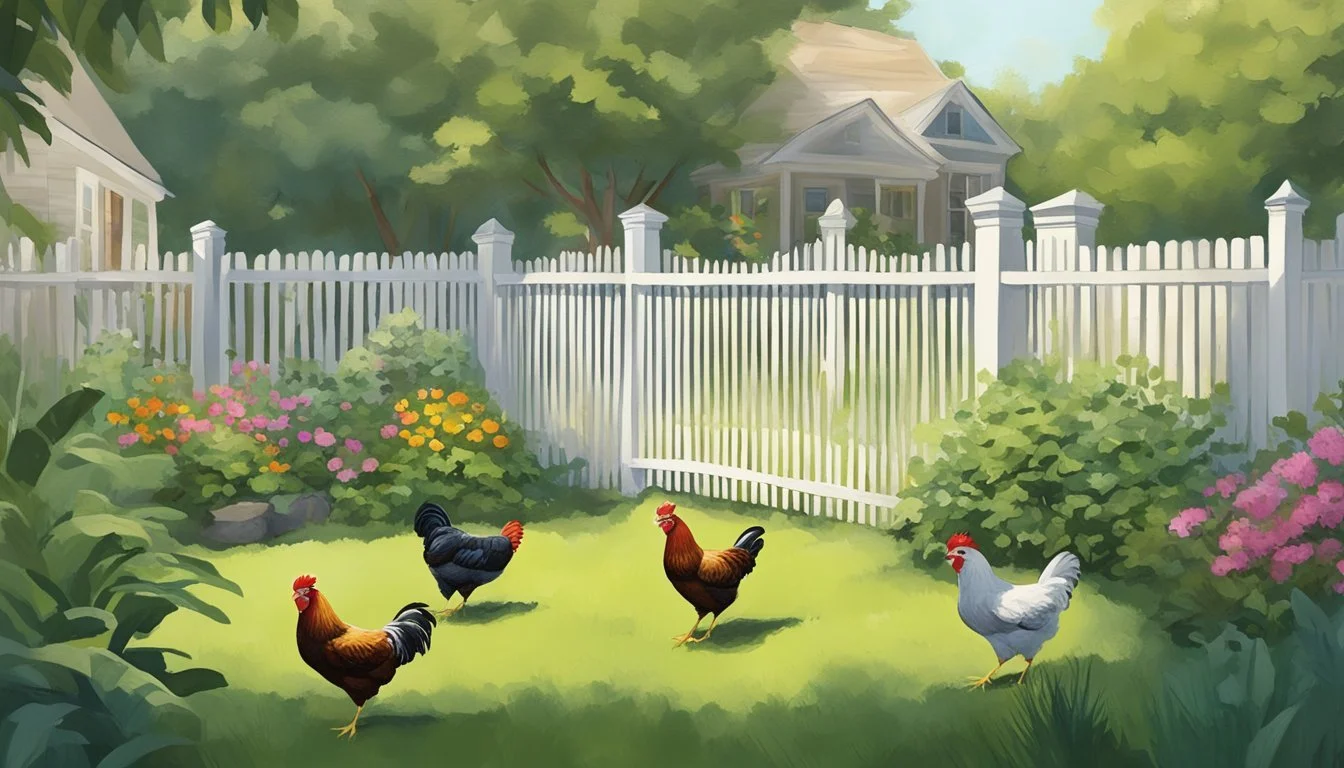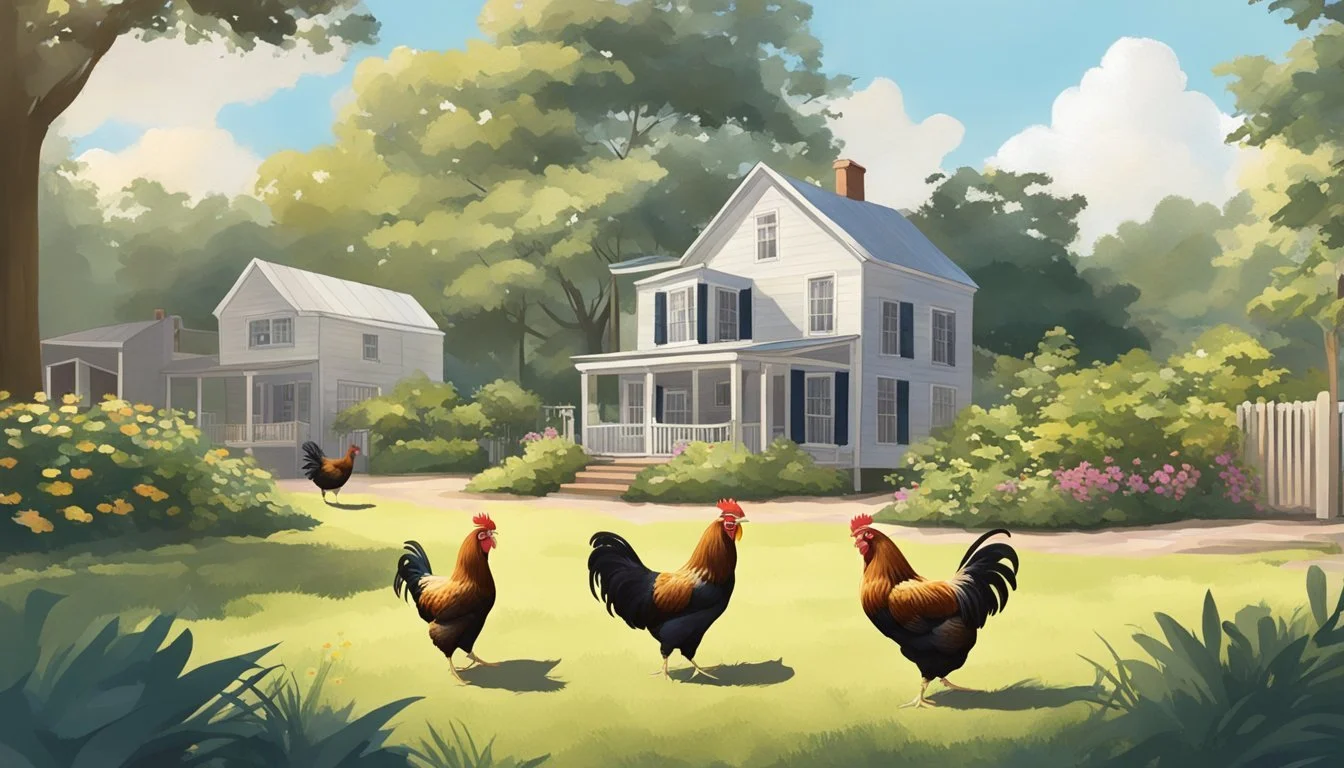Keeping Backyard Chickens in Charleston, SC
A Beginner's Guide to Urban Poultry
Keeping backyard chickens is a growing trend in Charleston, South Carolina, where the combination of a moderate climate and a community supportive of local and sustainable food practices makes urban poultry farming appealing. As more residents of Charleston consider the prospect of fresh eggs from their backyard, understanding the local regulations is essential to ensure this practice is undertaken responsibly and legally.
The city of Charleston allows residents to keep a limited number of chickens on their properties under specific conditions. To maintain harmony in urban settings, Charleston's local ordinances stipulate that each household is permitted to raise up to four chickens. The chickens must be housed in a secure coop or fenced area that provides at least 40 square feet of space and is enclosed by a barrier at least 4 feet high. This setup serves numerous purposes, including the protection of chickens from predators and prevention of any potential nuisance to neighbors.
Legislation requires that chicken enclosures be placed a minimum of 150 feet away from neighboring homes. However, flexibility is provided; residents can have the coop closer if they secure written permission from their adjoining neighbors. This requirement underscores the importance of community in Charleston and reflects an understanding that raising chickens in closer proximity to other homes necessitates neighborly communication and agreement.
Understanding Local Ordinances and Regulations
Before starting a backyard chicken flock in Charleston, SC, residents must understand and comply with local ordinances and regulations. These rules ensure the well-being of both the chickens and the community.
Assessing Zoning Laws and Residential Compliance
In Charleston, zoning laws dictate whether residents can keep chickens on their property. Homeowners should verify with local authorities whether their residential area is appropriately zoned for poultry. Urban areas within city limits have specific requirements compared to more rural settings.
Permit Requirements for Keeping Chickens
Obtaining the necessary permits is crucial before introducing chickens to a backyard. Residents must check with the City of Charleston or their local municipality to determine if a permit is required and, if so, the process to acquire one.
Examining Restrictions on Number and Type of Chickens
Charleston's regulations control the number of chickens a resident can keep. A maximum of four chickens is typical, and the birds must be housed in a secure, enclosed coop. There are often restrictions on the type of chickens allowed, with roosters frequently prohibited due to noise concerns.
Navigating Neighbors and Homeowners Association Rules
Homeowners should review any homeowners association rules to ensure compliance with local regulations. In some cases, written consent from neighbors within a specified distance (e.g., 150 feet) may be required. Maintaining open communication with neighbors is beneficial and ensures harmony within the community.
Setting Up Your Chicken Coop Correctly
Setting up a chicken coop correctly in Charleston, SC, involves careful planning to ensure it meets local regulations and supports the well-being of your chickens.
Choosing the Right Location and Size for Your Coop
The coop needs to be strategically placed on your property. You must satisfy Charleston's requirement of 40 square feet for the chicken enclosure, ensuring it is at least 4 feet high. It's critical to choose a location that is at least 150 feet away from neighbors' homes to comply with local guidelines, unless you have received written permission from them to do otherwise. The right size for your coop is a minimum of four square feet per chicken inside, and for the run, you must allocate eight to ten square feet per bird.
Ensuring Proper Ventilation and Protection
A well-ventilated coop is essential for healthy chickens, and to prevent moisture buildup that can lead to disease. The coop must offer ample protection against elements and predators. Features like strong fencing, secure latches, and covered runs contribute to a secure, safe home for your flock.
Maintaining Cleanliness to Prevent Odor and Pests
Cleanliness is crucial to prevent attracting rodents and vermin. Regular removal of waste and spent bedding helps control odor. Consider installing easy-to-clean surfaces and employ a routine to ensure the coop remains sanitary. Proper sanitation practices will prevent pests and diseases, contributing to a more pleasant and healthy environment for both chickens and their owners.
Caring for Your Backyard Chickens
Proper nutrition, safeguarding health, and predator deterrence are fundamental in backyard chicken keeping. These practices ensure the well-being and productivity of your hens.
Feeding and Watering: Best Practices
Feeding your chickens involves more than just providing feed; it includes understanding the nutritional needs of your hens. Layer pellets or crumbles are essential for egg-laying breeds, as they are formulated with the right balance of protein and calcium needed for shell production. Scratch grains can be offered sparingly as a treat.
Chickens must always have access to clean water. Water containers should be refilled daily to prevent algae growth and the spread of disease. In colder climates, ensure water doesn't freeze by using heated water dispensers.
Health and Safety: Recognizing Common Issues
Chickens are susceptible to various health issues, some of which are indicative of poor husbandry. Regular observation can help in the early detection of common problems like mites, lice, respiratory infections, and egg binding. Maintain a clean coop to reduce disease risk, and ensure that bedding is dry and ammonia levels are low.
Any signs of illness should be addressed quickly, usually with a combination of improved sanitary conditions, isolation of affected birds, and possibly veterinary care.
Predator Prevention Strategies
A predator-proof chicken coop is crucial for keeping your chickens safe. The coop should be enclosed with sturdy wire mesh to detour predators such as raccoons, foxes, or birds of prey. All potential entry points must be secured, including the use of locks on doors and enclosing outdoor runs.
Regularly inspecting your coop's integrity and making timely repairs is an effective strategy to prevent predator attacks. Installing motion-sensitive lights can work as a deterrent to nocturnal predators looking for an easy meal.
Neighborly Considerations and Community Relations
Keeping backyard chickens in Charleston, South Carolina requires considerations for neighbors to maintain positive community relations. Important aspects include managing noise and smells associated with chickens and engaging in clear communication with neighbors, particularly when seeking written permissions as per local regulations.
Dealing with Noise and Smell Concerns
Noise: Chickens are generally quieter than many pets, such as dogs; however, they can still cause disturbances, especially during early mornings. Homeowners should position coops as far from neighboring residences as practicable, at least 20 feet away, to minimize noise impact. Utilizing soundproofing materials in coop construction can also aid in reducing noise levels.
Smell: Proper sanitation is key to controlling odors emanating from chicken coops. Homeowners must commit to regular cleaning of the chicken coop, ensuring that bedding is changed frequently, and waste is disposed of properly. This helps prevent offensive smells that could affect neighboring properties.
Communicating with Neighbors and Securing Written Permissions
Communication: Clear and respectful dialogue with neighbors can often alleviate concerns about backyard chickens. Homeowners should inform neighbors of their decision to keep chickens, explaining the measures in place to address potential issues such as noise and smell.
Written Permission:
Regulations in Charleston require that chicken coops be located at least 150 feet from neighbors' homes.
If a coop is closer than this distance, written permission from affected neighbors is required.
Transparent communication about one's intent to keep chickens, coupled with an understanding of neighbors' opinions and potential opposition, is critical. Homeowners should provide complete information and offer to address any concerns, facilitating a supportive environment and obtaining the necessary permissions to comply with local laws.
Navigating Chicken Slaughter Laws
In Charleston, South Carolina, backyard chicken enthusiasts need to understand specific local ordinances related to the slaughter of chickens, as residential slaughtering is strictly regulated.
Understanding Legalities of Home Slaughtering
Charleston's municipal code mandates that no resident shall engage in the slaughtering of chickens within city limits on residential property. This law underscores the prohibition of home slaughter, and it is imperative for chicken owners to comply with these regulations to avoid legal repercussions. Residents must be aware that backyard slaughtering may be subject to legal penalties if performed without adherence to the local ordinances.
Exploring Alternatives to Home Slaughtering
Given the clear restrictions on slaughtering chickens on residential properties in Charleston, residents must explore alternative methods. One could consider:
Using Professional Services: Licensed facilities that offer slaughtering services can ensure that the process is carried out humanely and legally.
Transporting to Legal Jurisdictions: Residents might transport their chickens to areas outside the city limits where slaughtering may be lawfully conducted, taking care to comply with both Charleston's regulations and those of the receiving jurisdiction.
It is essential to consult with local authorities or agricultural extension services to obtain up-to-date information on legal alternatives to backyard chicken slaughtering.
Local Chicken Ordinances in Greater Charleston Area
In the Greater Charleston area, local ordinances dictate specific regulations for keeping backyard chickens. These rules vary by city and are designed to ensure public health and neighborly relations.
Ordinances in Neighboring Cities and Counties
Charleston: It limits the number of chickens to four per property. Coops must provide a minimum of 40 square feet of space and be 4 feet high. They need to be located at least 150 feet from neighbors, unless written permission is granted.
Spartanburg: Allows up to six female chickens per residence without a mention of roosters.
Summerville: Local ordinances here are not specified in the results provided.
Sumter: Backyard chicken regulations here were not included in the information given.
Columbia: The search results did not provide specifics about Columbia's chicken keeping laws.
Rock Hill: The provided search results did not detail Rock Hill's ordinances on chicken keeping.
Moncks Corner: This locality's chicken laws are not covered in the search data provided.
Greer: No specific ordinance information for Greer was mentioned in the search results.
Comparative Look at Mount Pleasant and North Charleston Policies
Mount Pleasant: Residents must acquire a permit to keep chickens. Their enclosures must be secure, predator-proof, and well-ventilated, with regular maintenance to prevent unpleasant odors.
North Charleston: Ordinances for North Charleston weren't provided in the search results, and thus, details on chicken keeping in North Charleston are not available in this discussion.
Benefits of Backyard Chicken Keeping
Backyard chicken keeping in Charleston offers families the chance to enjoy fresh eggs, which are often considered superior in taste and nutrition compared to those bought from a store. When chickens are confined to a coop or fenced area, they provide eggs that are fresher due to reduced transportation and storage time.
Fresh Eggs: The eggs from a backyard flock have yolks that are typically richer and have a more robust flavor. They're also picked from the nest at peak freshness, ensuring a high-quality product.
In terms of health, fresh eggs from backyard chickens can contain higher levels of certain nutrients compared to commercially produced eggs. This includes omega-3 fatty acids, vitamin E, and beta carotene.
Animal Welfare: Families can ensure their flock is well-cared for. Chickens that are not confined to small cages live more natural lives. They can engage in behaviors such as foraging, which is both mentally stimulating and contributes to physical health.
Environmental Benefits: Raising chickens in a backyard setting can also be environmentally beneficial. Chickens are great foragers and can help control pests without the need for chemical insecticides. They also produce manure, which can be composted and used as a nutrient-rich fertilizer for gardens.
Community and Education: Finally, maintaining a backyard flock can serve as an educational experience for all ages, illustrating daily responsibilities and the origins of food. It connects people to the agrarian lifestyle and can foster community when neighbors share in the bounties and responsibilities of chicken keeping.
Procuring Chickens and Supplies
Before welcoming backyard chickens into their Charleston residence, individuals must navigate local regulations and ensure they are well-equipped. This process includes finding the right local suppliers for chickens and necessary equipment, as well as preparing a suitable outdoor space for their new feathered friends.
Local Sources for Chickens and Equipment
Charleston residents should first identify reputable local suppliers for purchasing chickens. It's advisable to select healthy female chickens, known as hens, for egg-laying purposes, as most local regulations often do not permit roosters due to noise concerns. Suppliers can range from local farms to specialty poultry stores. Essential supplies include a chicken coop, feeders, waterers, and potentially a chicken run for safe outdoor foraging. A prominent brand in the market is Omlet, known for their quality chicken coops and runs that offer durability and protection.
When selecting a coop, residents must consider space requirements. The coop should provide at least 40 square feet of space and be secured to protect the chickens from predators. For those with less space, customized solutions or compact coop designs from Omlet can help meet legal size requirements while maximizing the given area.
Preparing Your Backyard Space for Arrival
Once the procurement of chickens and supplies is underway, preparing the backyard space is the next crucial step. Charleston rules stipulate that coops must be positioned at least 150 feet from neighboring properties unless written permission is obtained. The designated area must also meet specific space criteria for the coop and any additional structures like chicken runs.
Residents should plan to:
Measure and designate an area of at least 40 square feet (minimum) for the coop.
Ensure the coop area has good drainage to prevent water accumulation and maintain hygiene.
Install secure fencing if a dedicated chicken run isn't used to protect chickens during their outdoor time.
By adhering to these guidelines, chicken enthusiasts can create a thriving environment for their backyard flock while maintaining good neighborly relations and complying with local Charleston regulations.










